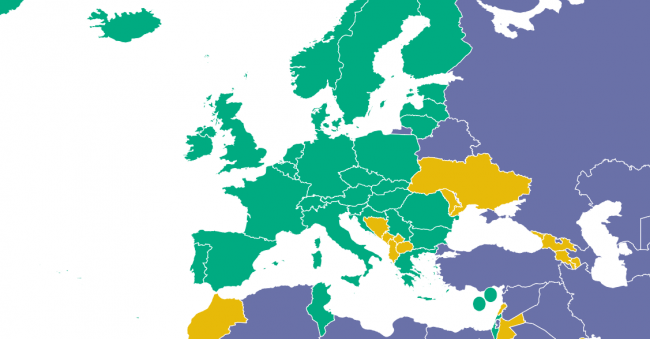

 Crimea, South Ossetia, and Azerbaijan have been ranked the least free places in Europe, in the latest edition of American rights group Freedom House’s Freedom in the World report. The report measures the degree of civil liberties and political rights across the world.
Crimea, South Ossetia, and Azerbaijan have been ranked the least free places in Europe, in the latest edition of American rights group Freedom House’s Freedom in the World report. The report measures the degree of civil liberties and political rights across the world.
Countries and territories were ranked on a scale from 0 to 100, with 0 being least free and 100 most free.
In the Caucasus, Georgia, Armenia, Abkhazia, and Nagorno-Karabakh were all rated ‘partly free’ scoring 64, 45, 41, and 30 respectively. Russia (including the North Caucasus), Azerbaijan, and South Ossetia were all classified ‘not free’, scoring 20, 12, and 10 points. These scored just ahead of Crimea, which was rated the least free place in Europe with a score of nine.
Most of these remained unchanged from last year, with the exception of South Ossetia, which dropped by one point, Azerbaijan which dropped by two, and Nagorno-Karabakh which fell by three points.
Separate ratings were not available for the Russian republics of the North Caucasus, which have some of the most restrictive regimes in the country.
The full reports are not yet available, but the highlights section said that Azerbaijan was one of a handful of countries that has experienced ‘dramatic declines in freedom’. In the last 10 years, Azerbaijan’s aggregate score declined by 19.
The report said that ‘perhaps the most alarming threats to democracy’ in the broader region of Eurasia involved authoritarian forces reaching across borders to punish critics.
Exiled Azerbaijani journalist Afgan Mukhtarli was mentioned as an example. Mukhtarli was kidnapped in Tbilisi by men allegedly in police uniforms who spoke Georgian, and was then transported across the border to Azerbaijan. According to the report, this raised ‘concerns that Georgian authorities were complicit in the abduction’. Mukhtarli was sentenced on 12 January to 6 years in prison, drawing international condemnation.
[Read on OC Media: Azerbaijan under fire over sentencing of abducted journalist Mukhtarli]
The report also mentioned the latest constitutional amendments in Georgia, initiated by the ruling Georgian Dream party, that ’combined with the financial backing of its reclusive billionaire patron — will make an effective challenge by the fractured opposition in future elections even more unlikely, potentially cementing the party’s control for years to come’.
[Read on OC Media: Georgia’s new constitution keeps real change in check]
For Armenia, Freedom House wrote that ‘heavily flawed voting highlighted the continuing erosion of democratic norms surrounding elections’. According to them, the ‘blatant electoral misconduct stands at odds with the country’s pursuit of a closer relationship with the European Union’. Armenia only recently signed a Comprehensive and Enhanced Partnership Agreement with the EU.
[Read on OC Media: The ups and downs of Armenia’s peculiar route to Europe]
The short version of the report did not focus on the condition of human rights in each of Russia’s North Caucasus republics, but mentioned recent reports of persecution of queer people in Chechnya.
[Read on OC Media: Witnesses detail continuing anti-queer purge in Chechnya]
The statements was based on the reporting of Russian newspaper Novaya Gazeta, which broke the story last year that Chechnya had detained and tortured dozens of men suspected of being queer. Freedom House said that the federal authorities ‘did not take significant action in response to the allegations’.
For ease of reading, we choose not to use qualifiers such as ‘de facto’, ‘unrecognised’, or ‘partially recognised’ when discussing institutions or political positions within Abkhazia, Nagorno-Karabakh, and South Ossetia. This does not imply a position on their status.









